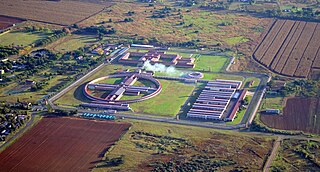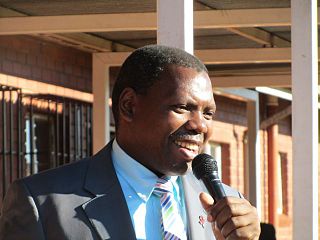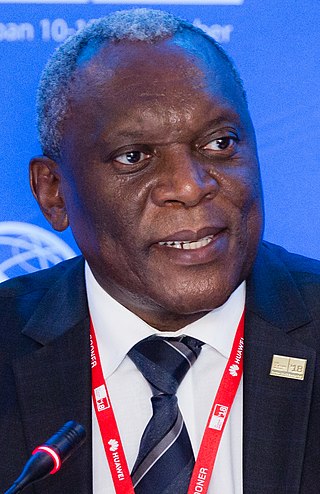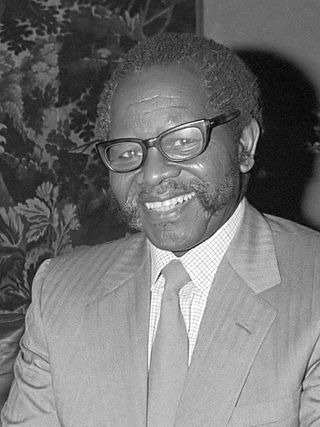Related Research Articles

KwaZulu-Natal is a province of South Africa that was created in 1994 when the government merged the Zulu bantustan of KwaZulu and Natal Province.

The Inkatha Freedom Party is a conservative political party in South Africa, which is a part of the current South African government of national unity together with the African National Congress (ANC). Although registered as a national party, it has had only minor electoral success outside its home province of KwaZulu-Natal. Mangosuthu Buthelezi, who served as chief minister of KwaZulu during the Apartheid period, founded the party in 1975 and led it until 2019. He was succeeded as party president in 2019 by Velenkosini Hlabisa.

Prince Mangosuthu Gatsha Buthelezi was a South African politician and Zulu prince who served as the traditional prime minister to the Zulu royal family from 1954 until his death in 2023. He was appointed to this post by King Bhekuzulu, the son of King Solomon kaDinuzulu, a brother to Buthelezi's mother Princess Magogo kaDinuzulu.
Nkosinathi Phiwayinkosi Thamsanqa Nhleko is a South African politician and former trade unionist from KwaZulu-Natal. He was the Minister of Police and Minister of Public Works in the second cabinet of President Jacob Zuma. In March 2024, he resigned from the African National Congress (ANC) and became the national organiser for Zuma's Umkhonto we Sizwe Party.

Prisons in South Africa are run by the Department of Correctional Services. The department is divided into six administrative regions, each with its own regional commissioner, and subdivided into multiple areas, each headed by an area commissioner. According to the ministry, there are approximately 34,000 employees of the department running 240 prisons. In those prisons are nearly 156,000 inmates as of August 2013. The prisons include minimum, medium, maximum and super-maximum security facilities. They may be entirely dedicated to a specific group of prisoners, such as women or children, or be divided into separate sections for each group. Since 2024, the Minister of Correctional Services has been Pieter Groenewald.

The State Security Council (SSC) was formed in South Africa in 1972 to advise the government on the country's national policy and strategy concerning security, its implementation and determining security priorities. Its role changed through the prime ministerships of John Vorster and PW Botha, being little used during the former's and during the latter's, controlling all aspects of South African public's lives by becoming the Cabinet. During those years he would implement a Total National Strategy, Total Counter-revolutionary Strategy and finally in the mid-eighties, established the National Security Management System (NSMS). After FW de Klerk's rise to the role of State President, the Cabinet would eventually regain control of the management of the country. After the 1994 elections a committee called National Intelligence Co-ordinating Committee was formed to advise the South African president on security and intelligence as well as its implementation.
The National Intelligence Service (NIS) was an intelligence agency of the Republic of South Africa that replaced the older Bureau of State Security (BOSS) in 1980. Associated with the Apartheid era in South Africa, it was replaced on 1 January 1995 by the South African Secret Service and the National Intelligence Agency with the passage of the Intelligence Act (1994).

Zwelini Lawrence Mkhize is a South African medical doctor and politician who served as the Minister of Health from May 2019 until his resignation on 5 August 2021. He previously served as the Minister of Cooperative Governance and Traditional Affairs from 2018 to 2019. Before that, he was the fifth Premier of KwaZulu-Natal from 2009 to 2013.
There have been many political assassinations in post-apartheid South Africa. In 2013 it was reported that there had been more than 450 political assassinations in the province of KwaZulu-Natal since the end of apartheid in 1994. In July 2013 the Daily Maverick reported that there had been "59 political murders in the last five years". In August 2016 it was reported that there had been at least twenty political assassinations in the run up to the local government elections on the 3rd of August that year, most of them in KwaZulu-Natal.

Siyabonga Cyprian Cwele is a South African politician who served in the cabinet of South Africa from September 2008 to May 2019, most recently as the Minister of Home Affairs between 2018 and 2019. He was appointed as the South African Ambassador to China in December 2020. He is a member of the African National Congress (ANC) and represented the party in Parliament from 1994 to 2019.

Lindiwe Daphney Zulu is a South African politician and communications strategist who served as Minister of Social Development from May 2019 to May 2024. Before that she was the Minister of Small Business Development from 2014 to 2019. A member of the African National Congress (ANC), she has served on the party's National Executive Committee since December 2007.

Operation Vula was a secret domestic programme of the African National Congress (ANC) during the final years of apartheid in South Africa. Initiated in 1986 at the ANC headquarters in Lusaka and launched in South Africa in 1988, its operatives infiltrated weapons and banned ANC leaders into the country, in order to establish an underground network linking domestic activist structures with the ANC in exile. It was responsible for facilitating the only direct line of communication between ANC headquarters and Nelson Mandela, who at the time was imprisoned and was discussing a negotiated settlement with the government on the ANC's behalf. The operation was disbanded in 1990, after its existence had been publicly revealed and eight of its leaders charged under the Internal Security Act with terrorism and plotting an armed insurrection.
Sankie Dolly Mthembi-Mahanyele, formerly known as Sankie Mthembi-Nkondo or Sankie Nkondo, is a South African politician, diplomat, and former anti-apartheid activist. She was the Minister of Housing from 1995 to 2003 and served as Deputy Secretary-General of the African National Congress (ANC) from 2002 to 2007.

Riaz "Moe" Shaik, also spelled Mo Shaik, is a South African civil servant, diplomat, businessman, and former intelligence operative who has been the South African High Commissioner to Canada since 2022. He is a former chief of the National Intelligence Co-ordinating Committee and a former director of the foreign intelligence wing of the State Security Agency, at that time still called the South African Secret Service.
Zibuse Michael Mlaba was a South African politician and traditional leader who represented the African National Congress (ANC) in the KwaZulu-Natal Provincial Legislature between 2014 and 2019. He acted as the chief regent of the amaXimba from 1988 to 2008 and during apartheid was an outspoken supporter of the ANC.
Bhekumusi Gabriel "Sifiso" Nkabinde was a South African politician and alleged warlord in the KwaZulu-Natal Midlands. He represented the African National Congress (ANC) in the KwaZulu-Natal Provincial Legislature from 1994 until 1997.
Prince Mcwayizeni Israel Zulu was a South African politician and senior prince of the Zulu royal family. A son of King Solomon kaDinizulu, he acted as Zulu regent during the interregnum of 1968 to 1971 and was a close advisor to King Goodwill Zwelithini. He is also known for having overtly aligned himself to the African National Congress (ANC) during the final years of apartheid.
Magwaza Alfred Maphalala was a South African politician and trade unionist from KwaZulu-Natal. He represented the African National Congress (ANC) in the National Assembly from 1999 until his death in 2003. He was also a stalwart of the South African Communist Party (SACP) in KwaZulu-Natal.
Eric "Stalin" Mtshali was a South African politician, trade unionist, and anti-apartheid activist. He was a founding member both of the South African Congress of Trade Unions in 1955 and of Umkhonto we Sizwe in 1961. He was also a stalwart of the South African Communist Party.
The Government of KwaZulu-Natal is the subnational government of the South African province of KwaZulu-Natal (KZN). The politics of the province take place in the framework of a constitutional monarchy and liberal multi-party parliamentary democracy within a constitutional republic whereby the King of the Zulu Nation is the ceremonial figurehead of an elected government. The provincial government comprises the second sphere of government of South Africa and consists of three branches with checks and balances between them as follows:
References
- 1 2 3 4 5 6 7 8 9 Office of the Presidency (4 December 1999). "Statement on appointment of Directors-General". Polity.org.za. Archived from the original on 27 January 2016. Retrieved 16 September 2014.
- 1 2 3 "[Policy] In Seoul, A Fresh Look at Africa". asiasociety.org. 18 January 2011. Retrieved 16 September 2014.